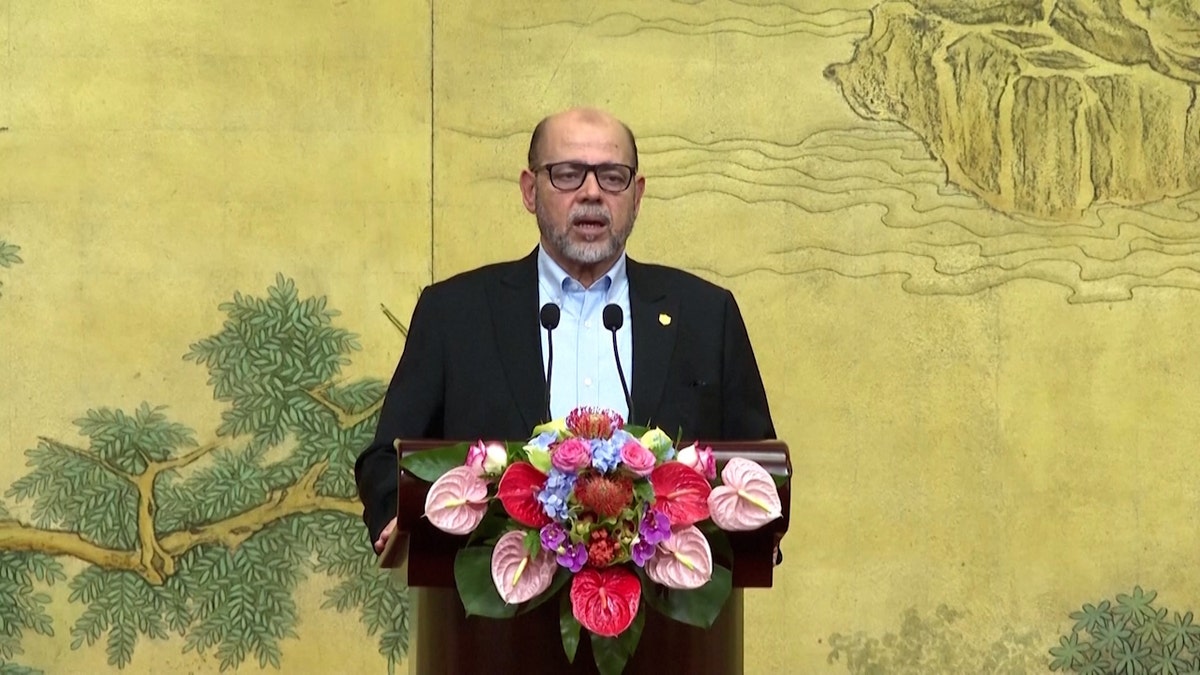GOP rep speaks out after attack by anti-Israel protester at RNC: We will not allow them to ‘intimidate us’
Rep. Derrick Van Orden, R-Wis., recalls being attacked by an anti-Israel protestor while attending the Republican National Convention.
- Opposing Palestinian factions agreed to form an interim national unity government during negotiations in China that ended on Tuesday with the signing of the Beijing Declaration, China's foreign ministry said.
- Previous efforts to reconcile rival Palestinian factions Hamas and Fatah have failed to do so. The Beijing Declaration has yet to be tested on the ground.
- The agreement displays China's growing influence in the Middle East. Last year, it brokered a breakthrough peace deal between longstanding regional foes Saudi Arabia and Iran.
Palestinian factions including rivals Hamas and Fatah agreed to end their divisions and form an interim national unity government during negotiations in China that ended on Tuesday, China's foreign ministry said.
The Beijing Declaration was signed at the closing ceremony of a reconciliation dialogue among 14 Palestinian factions held in China's capital from July 21-23, according to the readout.
Previous efforts by Egypt and other Arab countries to reconcile Hamas and Fatah have failed to end 17 years of power-sharing conflict that have weakened Palestinian political aspirations, and it remains to be seen whether this deal will survive the realities on the ground.
NETANYAHU'S MEETING AT WHITE HOUSE MOVED AMID BIDEN'S COVID RECOVERY, HARRIS CAMPAIGNING
The meeting was held amid attempts by international mediators to reach a ceasefire deal for Gaza, with one of the sticking points being the "day-after" plan - how the Hamas-run enclave will be governed once the war that began on Oct. 7 ends.
Senior Hamas official Hussam Badran said the most important point of the Beijing Declaration was to form a Palestinian national unity government to manage the affairs of Palestinians.
"This creates a formidable barrier against all regional and international interventions that seek to impose realities against our people's interests in managing Palestinian affairs post-war," Badran said.

Senior Hamas official Mousa Abu Marzouk speaks after signing a document to create a temporary Palestinian unity government in Beijing, China, on July 23, 2024. (Agency Pool / Reuters)
Israeli Prime Minister Benjamin Netanyahu has said his goal is to destroy the Iran-backed Hamas group and opposes it having any role in a post-war Gaza administration.
"Instead of rejecting terrorism, (Fatah leader) Mahmoud Abbas embraces the murderers and rapists of Hamas, revealing his true face. In reality, this won’t happen because Hamas' rule will be crushed, and Abbas will be watching Gaza from afar. Israel's security will remain solely in Israel's hands," Israeli Foreign Minister Israel Katz said on X.
Badran said the national unity government would manage the affairs of Palestinians in Gaza and the West Bank, oversee reconstruction, and prepare conditions for elections.
Currently, Hamas runs Gaza and Fatah forms the backbone of the Palestinian Authority, which has limited control in the Israeli-occupied West Bank. There has been no immediate comment from Fatah.
Details of the agreement did not set out a timeframe for forming a new government. In March, Palestinian President Mahmoud Abbas, who heads Fatah, appointed a new government led by one of his close aides, Mohammad Mustafa.
Ashraf Abouelhoul, a specialist on Palestinian affairs, said previous similar declarations had not been implemented and nothing would happen without U.S. approval.
"Forming a unity government with Hamas is rejected by the United States, Israel, and Britain. There is a consensus among those countries to exclude Hamas from any role in the day after the war," Abouelhoul said.
"What happened in China was nothing but a meeting, a celebratory event, but it is impossible to resolve the problems between Palestinian factions in just three days," said Abouelhoul, managing editor of the Egyptian state-owned paper Al-Ahram.
ISRAEL STRIKES IRAN-BACKED HOUTHIS AFTER TEHRAN PROXY ATTACKED JEWISH STATE: 'SIGNIFICANCE IS CLEAR'
FEUDING FACTIONS
Nonetheless, the agreement marks a diplomatic coup for Beijing and its growing influence in the Middle East, after it brokered a breakthrough peace deal between longstanding regional foes Saudi Arabia and Iran last year.
"The core achievement is to make it clear that the Palestine Liberation Organization is the sole legitimate representative of the Palestinian people," Chinese foreign minister Wang Yi said during the closing ceremony, according to the readout.
"China sincerely hopes that the Palestinian factions will achieve Palestinian independence at an early date on the basis of internal reconciliation, and is willing to strengthen communication and coordination with relevant parties to jointly work to implement the Beijing Declaration reached today."
The most "prominent highlight" was the agreement on forming an interim national reconciliation government around the post-war governance of Gaza, Wang said, adding that the international community should support efforts to form an interim Palestinian government to control Gaza and the West Bank.
Hamas and Islamic Jihad are not members of the PLO, the Palestinians' highest decision-making body, but they demand that any unity deal includes holding an election for the PLO parliament to secure their inclusion. The Islamist groups are at odds with the current PLO over peace accords with Israel.
"This declaration comes at an important time as our people are facing a genocidal war, especially in the Gaza Strip," a statement quoted Badran as saying.
Rival factions Hamas and Fatah first met in Beijing in April to discuss reconciliation efforts to end around 17 years of disputes, the first time a Hamas delegation was publicly known to have visited China since the war in Gaza began.
CLICK HERE TO GET THE FOX NEWS APP
The second round of talks, originally planned for last month, were delayed as both factions traded blame.
The long-feuding Palestinian factions have previously failed to heal their political disputes after Hamas fighters expelled Fatah from Gaza in a short war in 2007.
Chinese officials have ramped up advocacy for the Palestinians in international forums in recent months, calling for a larger-scale Israeli-Palestinian peace conference and a specific timetable to implement a two-state solution.









































